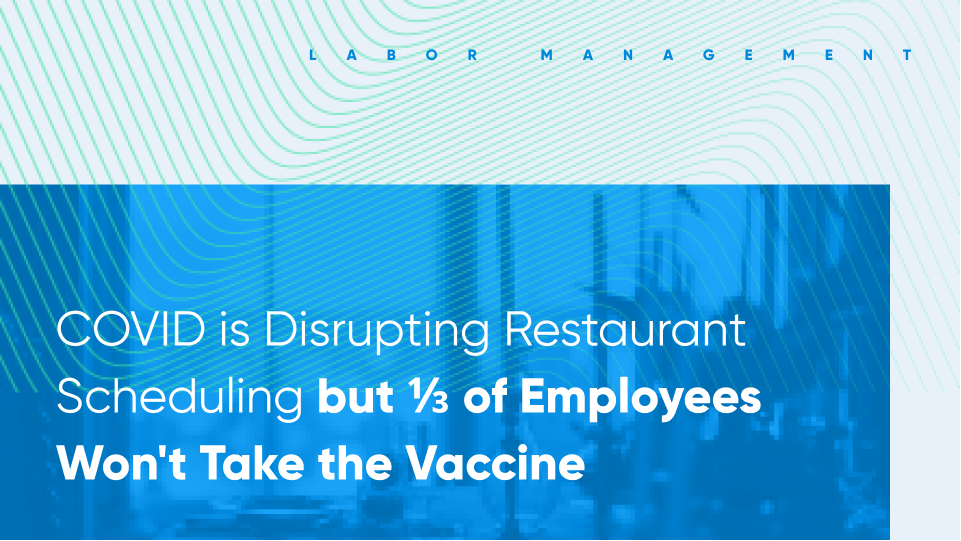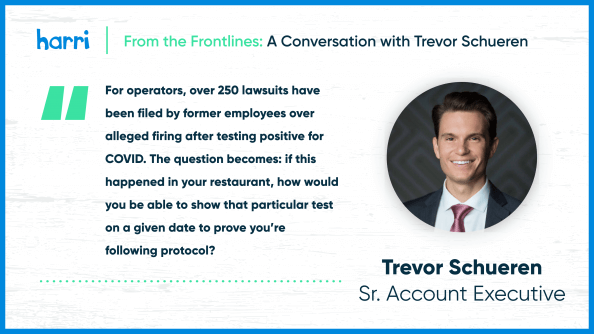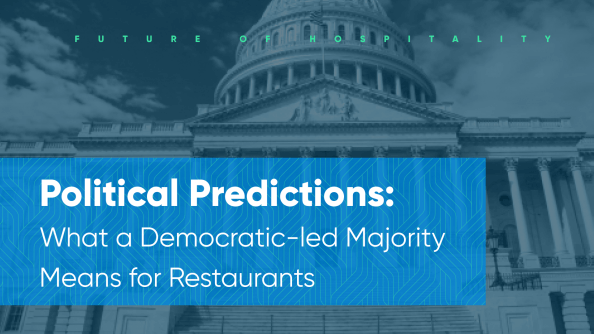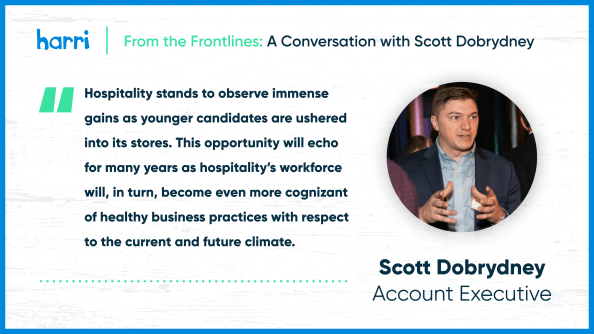COVID is Disrupting Restaurant Scheduling but ⅓ of Employees Won’t Take the Vaccine

- By Harri Insider Team | April 8, 2021
As restaurants continue to reopen and expand indoor dining capacity, job opportunities in the industry are rising. 286,000 restaurant jobs opened in February 2021 alone thanks to government-issued COVID-19 relief.
This is undoubtedly great news for hospitality businesses, but with these reopenings come new challenges. COVID-19 will continue to impact day-to-day restaurant operations, disrupting labor supply and creating complex scheduling conflicts as consumer demand grows amidst the spring reawakening.
Hospitality schedule disruption in the wake of COVID-19
Managers can spend hours creating labor-efficient, compliant schedules for each restaurant location, but we all know the unpredictability of the hospitality industry means no schedules are set in stone. Throw COVID-19 into the mix and labor allocation becomes even more difficult.
What happens when an employee or their family member gets exposed to, or worse, becomes infected with COVID-19? They’re out of work for two weeks at the minimum.
More and more hospitality operators are finding themselves perpetually understaffed. Increased federally-issued unemployment benefits combined with the (understandable) fear of COVID-19 has created one of the largest talent droughts that the hospitality industry has faced in a long time.
So what’s the solution here? For some, it might be enforcing vaccine mandates on employees to ensure COVID-19 safety in the workplace. If your employees can’t get sick, schedule disruption is reduced.
But there are two issues with this solution.
For one, vaccine rollout is not happening at the pace hospitality needs. Although foodservice workers are eligible for early-stage vaccination, securing a vaccine appointment is a huge challenge in itself, especially in larger cities. Relying on full-staff vaccination is no longer a viable strategy.
Second, our research finds that ⅓ of hospitality employees will refuse to take a COVID-19 vaccine, citing a desire to move to retail or other industries as a means to avoid vaccination. So even if employees can get a vaccine, that doesn’t mean they will.
Hospitality operators need to get creative in order to fill in that labor gap, which has led to a rise in tech adoption as a means to ensure consistent labor efficiency without spreading teams too thin.
Hiring restaurant workers during COVID-19
The ability to quickly source talent and cut down on time-to-hire will prove crucial to hospitality businesses struggling to match labor output with service demand. If and when an employee calls out, managers can be waiting with a pipeline of employees ready to fill in when needed at each location.
All-in-one HCM solutions build a single experience for the operators, managers, new hires, and applicants. That unified hiring experience begins in the pre-hiring stages.
Hiring tools designed for the nuances of the hospitality industry and its hourly workforce ensures fast yet highly effective pandemic hiring.
Far-reaching hiring processes with minimal friction increase your chances of success. Post job openings on multiple job boards simultaneously, ensure those jobs are mobile-friendly and can be completed in 5 minutes, and even accept (and reward) employee referrals for open roles.
Without the right tools to manage that influx of candidates, valuable candidates will slip through the cracks — especially if you’re hiring at scale. You’re taking one step forward and two steps back.
If your HCM platform also has a built-in ATS, all candidate data seamlessly flows from job application through every step of the interview process without requiring manual tracking efforts from your hiring managers.
Onboarding is the final stage here that, while certainly vital to successful hiring, is prone to paperwork-related bottlenecks. Did your new hires submit all of their required employment and tax documentation? Was it filled out correctly and approved by a manager? Were Fair Workweek-compliant good faith estimates distributed? Ensuring these tasks and more were executed as an arduous process without the help of a digital onboarding platform designed to help new hires hit the ground running even before their first day on the job.
When technology enables highly organized hiring, screening, and onboardings without adding additional burdens onto your already busy managers, time-to-hire improves. And if that all-in-one platform is flexible enough to fit your team’s specific needs, last-minute pandemic staffing transforms from a staffing crisis into a standard staffing procedure
While we touched on the many ways COVID-19 can throw a wrench into hospitality workforce scheduling, the right tools can minimize disruption and provide a labor cushion when last-minute callouts occur.
Harri provides a suite of hospitality-driven, intelligent scheduling tools to strategically handle both of those needs while also saving you money in compliance and labor efficiency.
Employee shift swap tools let a sick or exposed employee find a replacement for their shift without consulting a manager. Similarly, managers can set up voluntary on-call shifts during high-traffic times that employees can choose to pick up without requiring additional manager intervention. Because both options are completely employee-driven, all schedule changes are 100% compliant with wage and labor laws to prevent one-time premium payment charges.
When it comes to schedule-building itself, Harri’s intelligent scheduling platform ensures labor-efficient scheduling. Historic sales data helps managers determine the best time to have extra hands on deck, then matches that up against other factors like employee availability, weather, and more. All labor costs break requirements, and premium payments are generated in real-time so your team can schedule the exact labor percentage they need without vastly overshooting budget.
While these scheduling benefits may sound great, they’re not worth much if they’re not accessible to your team. After all, managers are so busy putting out fires in the field they rarely have time to leave a location to perform back office tasks.
That’s exactly why mobile solutions like Harri are so valued in the industry — when managers have easy-to-use, powerful scheduling at their fingertips, working around call-outs and other last-minute schedule adjustments is as easy as pressing a button on your smartphone. No matter how crazy the day gets, managers will always know what labor options are available and any labor costs associated with last-minute call-ins.
HCM tech helps restaurants maximize COVID-19 labor efficiency
We’ve seen a good portion of restaurants offer vaccine incentives to encourage employees to take the vaccine, but that will hardly fill the gap for the ⅓ that will avoid vaccination.
Operators using HCM tech to offset labor disruption and ensure labor efficiency will find themselves with better service outputs without overworking their healthy employees. If COVID-19 does threaten employee’s ability to work, these businesses are prepared to continue serving guests while also providing affected staff with the support they need.





















